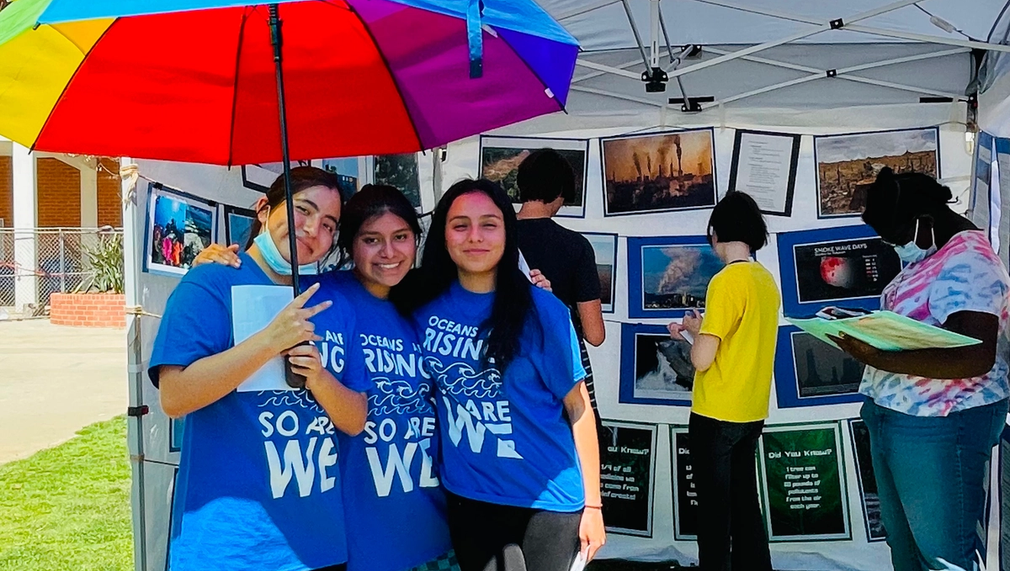Human Rights and the Climate Crisis
Climate change is the defining issue of our time. It isn’t just an environmental crisis—it’s also a human rights crisis that disproportionately affects at-risk communities and youth. The HRW Student Task Force is campaigning for our 15 LA-area campuses and school districts to transition to 100% renewable energy and to embed climate education across curricula. We are registering and educating climate voters and engaging public officials and candidates running for office in 2022. Our message is clear: we can’t afford to wait any longer.

What is the primary issue area that your application will impact?
Climate and Environment
In which areas of Los Angeles will you be directly working?
San Fernando Valley
South LA
West LA
South Bay
In what stage of innovation is this project, program, or initiative?
Expand existing project, program, or initiative
What is your understanding of the issue that you are seeking to address?
The climate crisis poses an unprecedented threat to human rights. Wildfires, drought and rising sea levels are jeopardizing lives and livelihoods across LA. If governments fail to take aggressive action to fight climate change, our human rights to life, education, health, food and clean water will suffer catastrophically. As the crisis worsens, young people will be most affected. Yet LA-area youth are not learning about the impacts of climate change or how they can create change. In a recent climate education survey conducted by the HRW Student Task Force, a student from Chatsworth said, “Considering that it is the most pressing issue facing every person in the entire world, I think climate change should be taught extensively in school.” Additionally, schools are often among the largest energy consumers in a community; LAUSD is the LA Department of Water and Power’s single-largest energy customer. Schools must reduce their carbon footprint to protect the students they serve.
Describe the project, program, or initiative this grant will support to address the issue.
After California experienced more than 7,800 wildfires in 2019, STFers decided to launch the “Human Rights and the Climate Crisis” Campaign to empower youth to fight against the climate crisis by creating change locally. The campaign’s goals are to: (1) transition their schools and districts to 100% renewable energy; (2) commit to rigorous energy efficiency; and (3) secure environmental justice and equity education. STF members are raising their voices, pressing school administrators and district bureaucracies to act. “Individual actions are great, but we need more than meatless Mondays or riding our bikes to stop the climate crisis,” said one student leader. In addition to meeting with decision-makers, STFers are surveying teachers and students to identify access to climate education and encourage educators to embed it across subjects. Students believe the key to their advocacy starts with education. They will work with the STF team to develop curriculum, resources, and materials and support teacher professional development trainings. Students are also hosting experiential tent events, guest speakers, film screenings, workshops, and classroom presentations to engage their school communities in their advocacy. Their connection to Human Rights Watch—an international organization that documents human rights abuses in more than 100 countries worldwide—provides them with in-depth knowledge and resources to effectively highlight the human rights at risk due to climate change.
Describe how Los Angeles County will be different if your work is successful.
While our advocacy is directed at the communities we serve, it will have global impacts. Examples of the impact our campaign may have on LA County include: • Reducing carbon emissions in LA. Schools are among the largest energy consumers in a community. Transitioning to 100% renewable energy will help them reduce their carbon footprint. Schools that install solar could ease the burden on local power grids, while also lowering annual energy costs. • Educating students on the human impacts of climate change. Successfully integrating climate education across school subjects will create generations of youth who will understand and be equipped to combat the climate crisis. Through education, students will become informed voters and decision-makers, ensuring their futures are environmentally sustainable. • Uplifting the voices of youth in the local community. The program trains youth on how to effectively communicate with their peers and advocate with government officials and policymakers.
What evidence do you have that this project, program, or initiative is or will be successful, and how will you define and measure success?
HRW launched its Student Task Force in 1999 to train young people to become the next generation of human rights advocates. Past campaigns include juvenile justice reform in CA and homeless youth in LA. STF launched our Human Rights and the Climate Crisis Campaign in 2021. Thanks to our student advocacy, in May 2021, the Palisades Charter HS Board of Trustees adopted the first-ever student resolution committing to transitioning the campus to 100% renewable energy, improving energy efficiency, and embedding climate change education for students and employees. Our students have also held educational events engaging thousands of classmates, educators and community members. More than 800 students and 60 educators have responded to our climate education surveys, leading to professional and curriculum development support for teachers. Finally, STFers are registering and educating voters about the climate, and demanding commitments for climate action from candidates running for office.
Approximately how many people will be impacted by this project, program, or initiative?
Direct Impact: 250
Indirect Impact: 34,000